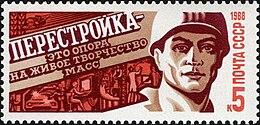
Back Perestroika Afrikaans Perestroika ALS بيريسترويكا Arabic Perestroika AST Perestroyka Azerbaijani Perestroika BCL Перабудова Byelorussian Перабудова BE-X-OLD Перестройка Bulgarian Perestroika Catalan
This article needs additional citations for verification. (November 2023) |
This article includes a list of general references, but it lacks sufficient corresponding inline citations. (November 2018) |
| Perestroika | |
| Russian | перестройка |
|---|---|
| Romanization | perestrojka |
| Literal meaning | rebuilding, restructuring |

| Politics of the Soviet Union |
|---|
 |
|
|
Perestroika (/ˌpɛrəˈstrɔɪkə/; Russian: перестройка, IPA: [pʲɪrʲɪˈstrojkə] ⓘ)[1] was a political reform movement within the Communist Party of the Soviet Union (CPSU) during the late 1980s widely associated with CPSU general secretary Mikhail Gorbachev and his glasnost (meaning "transparency") policy reform. The literal meaning of perestroika is "restructuring", referring to the restructuring of the political and economic systems of the Soviet Union, in an attempt to end the Era of Stagnation.
Perestroika allowed more independent actions from various ministries and introduced many market-like reforms. The purported goal of perestroika, however, was not to end the command economy but rather to make socialism work more efficiently to better meet the needs of Soviet citizens by adopting elements of liberal economics.[2] The process of implementing perestroika added to existing shortages, and created political, social, and economic tensions within the Soviet Union.[3][4] Furthermore, it is often blamed for the political ascent of nationalism and nationalist political parties in the constituent republics.[5]
Gorbachev first used the term in a speech during his visit to Tolyatti in 1986. Perestroika lasted from 1985 until 1991, and is often argued to be a significant cause of the collapse of the Eastern Bloc and the dissolution of the Soviet Union.[6]
With respect to the foreign policy Gorbachev promoted "new political thinking": de-ideologization of international politics, abandoning the concept of class struggle, priority of universal human interests over the interests of any class, increasing interdependence of the world, and mutual security based on political rather than military instruments. The doctrine constituted a significant shift from the previous principles of the Soviet foreign politics.[7][8][9] This marked the end of the Cold War.[10]
- ^ Professor Gerhard Rempel, Department of History, Western New England College (2 February 1996). "Gorbachev and Perestroika". Mars.wnec.edu. Archived from the original on 28 August 2008. Retrieved 31 March 2010.
{{cite web}}: CS1 maint: multiple names: authors list (link) - ^ Mikhail Gorbachev, Perestroika (New York: Harper Collins, 1987), quoted in Mark Kishlansky, ed., Sources of the West: Readings in Western Civilization, 4th ed., vol. 2 (New York: Longman, 2001), p. 322.
- ^ "How 'Glasnost' and 'Perestroika' Changed the World". TIME. 2022-08-30. Retrieved 2024-02-02.
- ^ Kolesnikov, Andrei (August 8, 2022). "Gorbachev's Revolution". Carnegie Politika. Retrieved February 2, 2024.
- ^ "Perestroika: Glasnost, Definition & Soviet Union". HISTORY. 2022-11-01. Retrieved 2024-02-02.
- ^ Kotkin, Stephen (2001). Armageddon Averted. Oxford University Press. ISBN 978-0-19-280245-3.
- ^ "Gorbachev's New Thinking", by David Holloway, Foreign Affairs, vol.68 no.1
- ^ "Gorbachev and New Thinking in Soviet Foreign Policy, 1987-88", USDOS archive
- ^ New Thinking: Foreign Policy under Gorbachev, in: Glenn E. Curtis, ed. Russia: A Country Study, Washington: GPO for the Library of Congress, 1996.
- ^ Katrina vanden Heuvel & Stephen F. Cohen. (16 November 2009). "Gorbachev on 1989". Thenation.com. Archived from the original on 25 May 2012.
© MMXXIII Rich X Search. We shall prevail. All rights reserved. Rich X Search